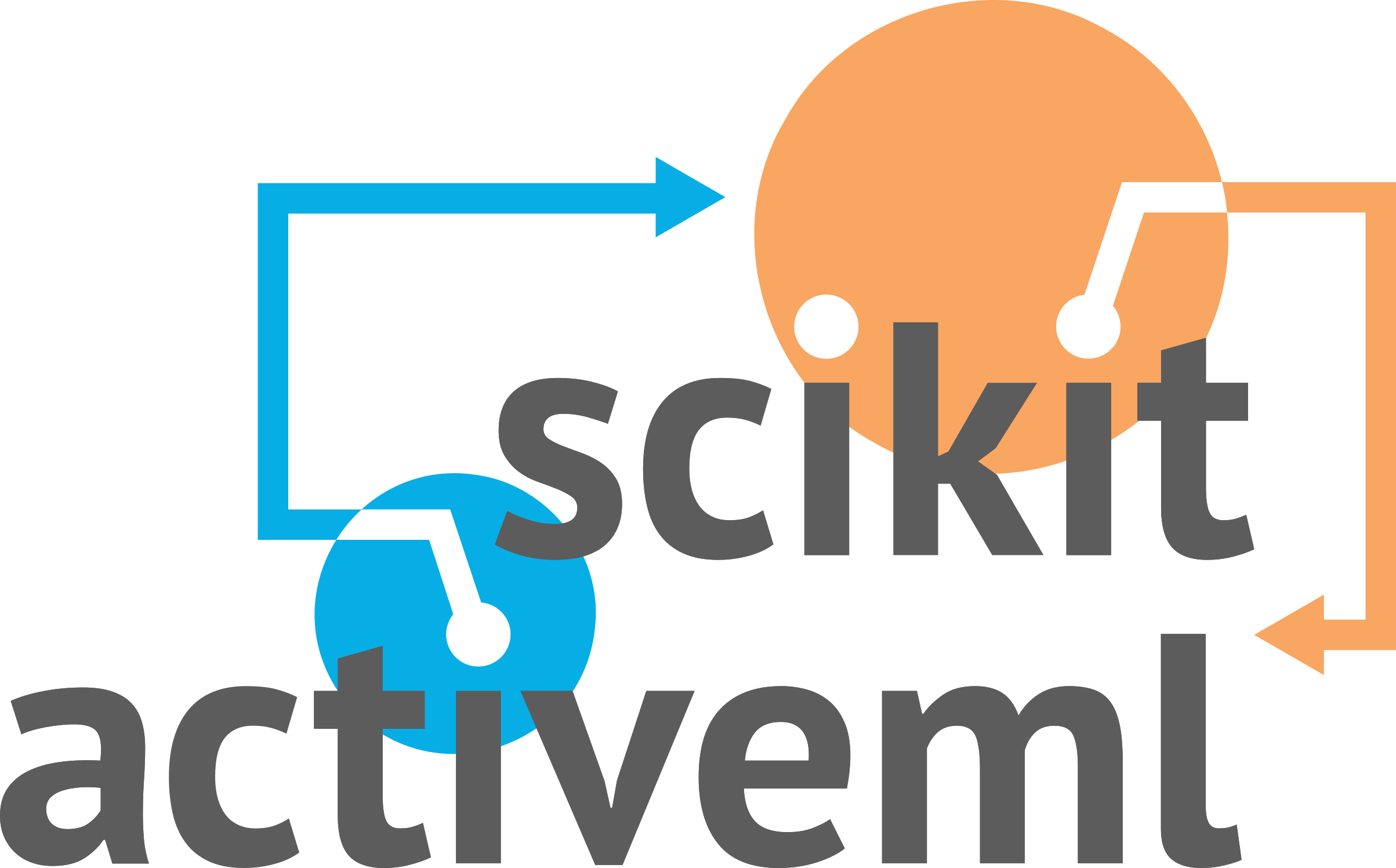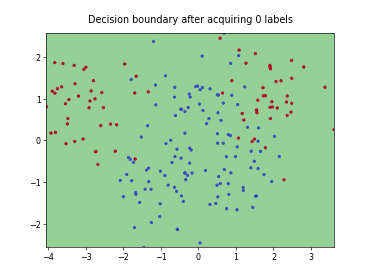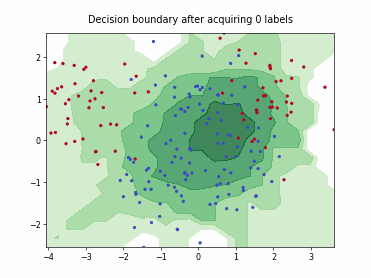ProbabilisticAL#
- class skactiveml.pool.ProbabilisticAL(prior=1, m_max=1, missing_label=nan, metric=None, metric_dict=None, random_state=None)[source]#
Bases:
SingleAnnotatorPoolQueryStrategyMulti-class Probabilistic Active Learning (McPAL)
This class implements the query strategy Multi-class Probabilistic Active Learning (McPAL) [1], which scores each unlabeled sample by the density-weighted expected gain in a target performance metric (e.g., accuracy), integrating a sample’s impact, its class posterior, and the posterior’s reliability via a closed-form expectation over all possible labelings. This yields a non-myopic selector for multi-class problems. Its effectiveness hinges on calibrated posteriors and sensible density estimates.
- Parameters:
- priorfloat, default=1.0
Prior probabilities for the Dirichlet distribution of the samples.
- m_maxint, default=1.0
Maximum number of hypothetically acquired labels.
- missing_labelscalar or string or np.nan or None, default=np.nan
Value to represent a missing label.
- metricstr or callable, default=None
The metric must be None or a valid kernel as defined by the function sklearn.metrics.pairwise.pairwise_kernels. The kernel is used to calculate the frequency of labels near the candidates and multiplied with the probabilities returned by clf to get a kernel frequency estimate for each class. If metric is set to None, the predict_freq function of the clf will be used instead. If this is not defined, a TypeError is raised.
- metric_dictdict, default=None
Any further parameters that should be passed directly to the kernel function. If metric_dict is None and metric is ‘rbf’ metric_dict is set to {‘gamma’: ‘mean’}.
- random_stateNone or int or np.random.RandomState, default=None
The random state to use.
References
[1]D. Kottke, G. Krempl, D. Lang, J. Teschner, and M. Spiliopoulou. Multi-class Probabilistic Active Learning. In Eur. Conf. Artif. Intell., pages 586–594, 2016.
Methods
Get metadata routing of this object.
get_params([deep])Get parameters for this estimator.
query(X, y, clf[, fit_clf, sample_weight, ...])Query the next samples to be labeled.
set_params(**params)Set the parameters of this estimator.
- get_metadata_routing()#
Get metadata routing of this object.
Please check User Guide on how the routing mechanism works.
- Returns:
- routingMetadataRequest
A
MetadataRequestencapsulating routing information.
- get_params(deep=True)#
Get parameters for this estimator.
- Parameters:
- deepbool, default=True
If True, will return the parameters for this estimator and contained subobjects that are estimators.
- Returns:
- paramsdict
Parameter names mapped to their values.
- query(X, y, clf, fit_clf=True, sample_weight=None, utility_weight=None, candidates=None, batch_size=1, return_utilities=False)[source]#
Query the next samples to be labeled.
- Xarray-like of shape (n_samples, n_features)
Training data set, usually complete, i.e., including the labeled and unlabeled samples.
- yarray-like of shape (n_samples,)
Labels of the training data set (possibly including unlabeled ones indicated by self.missing_label.)
- clfskactiveml.base.SkactivemlClassifier
Classifier implementing the methods fit and predict_proba.
- fit_clfbool, default=True
Defines whether the classifier clf should be fitted on X, y, and sample_weight.
- sample_weight: array-like of shape (n_samples,), default=None
Weights of training samples in X.
- utility_weightarray-like, default=None
Weight for each candidate (multiplied with utilities). Usually, this is to be the density of a candidate in ProbabilisticAL. The length of utility_weight is usually n_samples, except for the case when candidates contains samples (ndim >= 2). Then the length is n_candidates.
- candidatesNone or array-like of shape (n_candidates, ) of type int, default=None
If candidates is None, the unlabeled samples from (X,y) are considered as candidates.
If candidates is of shape (n_candidates,) and of type int, candidates is considered as the indices of the samples in (X,y).
If candidates is of shape (n_candidates, …), candidates is considered as the candidate samples in (X,y).
- batch_sizeint, default=1
The number of samples to be selected in one AL cycle.
- return_utilitiesbool, default=False
If true, also return the utilities based on the query strategy.
- Returns:
- query_indicesnumpy.ndarray of shape (batch_size)
The query indices indicate for which candidate sample a label is to be queried, e.g., query_indices[0] indicates the first selected sample.
If candidates is None or of shape (n_candidates,), the indexing refers to the samples in X.
If candidates is of shape (n_candidates, n_features), the indexing refers to the samples in candidates.
- utilitiesnumpy.ndarray of shape (batch_size, n_samples)
The utilities of samples after each selected sample of the batch, e.g., utilities[0] indicates the utilities used for selecting the first sample (with index query_indices[0]) of the batch. Utilities for labeled samples will be set to np.nan.
If candidates is None, the indexing refers to the samples in X.
If candidates is of shape (n_candidates,) and of type int, utilities refers to the samples in X.
If candidates is of shape (n_candidates, …), utilities refers to the indexing in candidates.
- set_params(**params)#
Set the parameters of this estimator.
The method works on simple estimators as well as on nested objects (such as
Pipeline). The latter have parameters of the form<component>__<parameter>so that it’s possible to update each component of a nested object.- Parameters:
- **paramsdict
Estimator parameters.
- Returns:
- selfestimator instance
Estimator instance.


